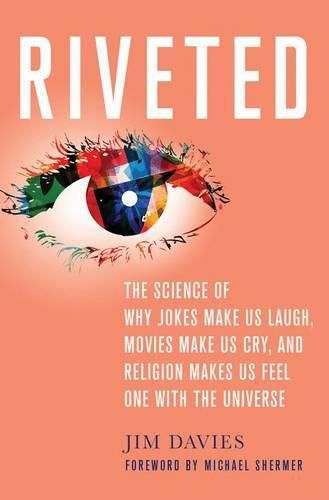Readings Newsletter
Become a Readings Member to make your shopping experience even easier.
Sign in or sign up for free!
You’re not far away from qualifying for FREE standard shipping within Australia
You’ve qualified for FREE standard shipping within Australia
The cart is loading…






This title is printed to order. This book may have been self-published. If so, we cannot guarantee the quality of the content. In the main most books will have gone through the editing process however some may not. We therefore suggest that you be aware of this before ordering this book. If in doubt check either the author or publisher’s details as we are unable to accept any returns unless they are faulty. Please contact us if you have any questions.
Why do some things pass under the radar of our attention, but other things capture our interest? Why do some religions catch on and others fade away? What makes a story, a movie, or a book riveting? Why do some people keep watching the news even though it makes them anxious?The past 20 years have seen a remarkable flourishing of scientific research into exactly these kinds of questions. Professor Jim Davies’ fascinating and highly accessible book, Riveted, reveals the evolutionary underpinnings of why we find things compelling, from art to religion and from sports to superstition. Compelling things fit our minds like keys in the ignition, turning us on and keeping us running, and yet we are often unaware of what makes these keys fit. What we like and don’t like is almost always determined by subconscious forces, and when we try to consciously predict our own preferences we’re often wrong. In one study of speed dating, people were asked what kinds of partners they found attractive. When the results came back, the participants’ answers before the exercise had no correlation with who they actually found attractive in person! We are beginning to understand just how much the brain makes our decisions for us: we are rewarded with a rush of pleasure when we detect patterns, as the brain thinks we’ve discovered something significant; the mind urges us to linger on the news channel or rubberneck an accident in case it might pick up important survival information; it even pushes us to pick up People magazine in order to find out about changes in the social structure. Drawing on work from philosophy, anthropology, religious studies, psychology, economics, computer science, and biology, Davies offers a comprehensive explanation to show that in spite of the differences between the many things that we find compelling, they have similar effects on our minds and brains.
$9.00 standard shipping within Australia
FREE standard shipping within Australia for orders over $100.00
Express & International shipping calculated at checkout
This title is printed to order. This book may have been self-published. If so, we cannot guarantee the quality of the content. In the main most books will have gone through the editing process however some may not. We therefore suggest that you be aware of this before ordering this book. If in doubt check either the author or publisher’s details as we are unable to accept any returns unless they are faulty. Please contact us if you have any questions.
Why do some things pass under the radar of our attention, but other things capture our interest? Why do some religions catch on and others fade away? What makes a story, a movie, or a book riveting? Why do some people keep watching the news even though it makes them anxious?The past 20 years have seen a remarkable flourishing of scientific research into exactly these kinds of questions. Professor Jim Davies’ fascinating and highly accessible book, Riveted, reveals the evolutionary underpinnings of why we find things compelling, from art to religion and from sports to superstition. Compelling things fit our minds like keys in the ignition, turning us on and keeping us running, and yet we are often unaware of what makes these keys fit. What we like and don’t like is almost always determined by subconscious forces, and when we try to consciously predict our own preferences we’re often wrong. In one study of speed dating, people were asked what kinds of partners they found attractive. When the results came back, the participants’ answers before the exercise had no correlation with who they actually found attractive in person! We are beginning to understand just how much the brain makes our decisions for us: we are rewarded with a rush of pleasure when we detect patterns, as the brain thinks we’ve discovered something significant; the mind urges us to linger on the news channel or rubberneck an accident in case it might pick up important survival information; it even pushes us to pick up People magazine in order to find out about changes in the social structure. Drawing on work from philosophy, anthropology, religious studies, psychology, economics, computer science, and biology, Davies offers a comprehensive explanation to show that in spite of the differences between the many things that we find compelling, they have similar effects on our minds and brains.